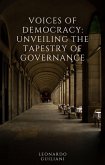Whether the Congress party put forth a clichéd argument of accountability versus stability in defence of a parliamentary system, in haste, to enjoy the plums of office is the debate at the core of this book. The author takes the debate out of the realms of academia and into the homes of general readers. Students of history, political science and law have been fed on works of celebrated authors on the making of the Constitution of India. This is only half the story told.
This book captures the disquiet among the members of the Constituent Assembly and outbursts by members of the dominant party that its leaders were 'settling' the Constitution behind closed doors. It examines threadbare the conclusion of many scholars that a great amount of deliberation and debate on merit took place in the Constituent Assembly before arriving at a form of government best suited to India. Proposed meaningful and far-reaching amendments made by some members, whom Ambedkar fondly called the 'rebels', were rejected outright, under one pretext or another, to silence dissent.
The post-Independence political history of India bears testimony that the apprehensions voiced by these so-called 'rebels' played out to be true. In the Constituent Assembly, however, their voices, pregnant with a warning, were voices in the wilderness.
Hinweis: Dieser Artikel kann nur an eine deutsche Lieferadresse ausgeliefert werden.
This book captures the disquiet among the members of the Constituent Assembly and outbursts by members of the dominant party that its leaders were 'settling' the Constitution behind closed doors. It examines threadbare the conclusion of many scholars that a great amount of deliberation and debate on merit took place in the Constituent Assembly before arriving at a form of government best suited to India. Proposed meaningful and far-reaching amendments made by some members, whom Ambedkar fondly called the 'rebels', were rejected outright, under one pretext or another, to silence dissent.
The post-Independence political history of India bears testimony that the apprehensions voiced by these so-called 'rebels' played out to be true. In the Constituent Assembly, however, their voices, pregnant with a warning, were voices in the wilderness.
Hinweis: Dieser Artikel kann nur an eine deutsche Lieferadresse ausgeliefert werden.









